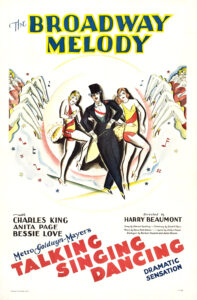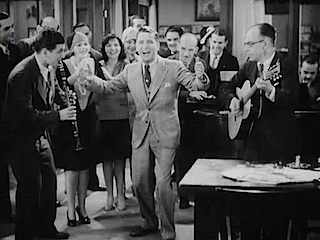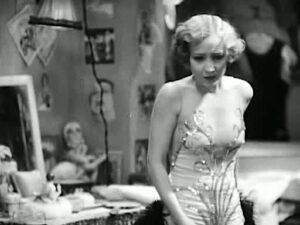The Broadway Melody (1928-29)
 Released in February of 1929, The Broadway Melody was billed as the first all-talking, all-singing, all-dancing motion picture. Timing is everything, as they say, and it’s fascinating to note that this frothy, sentimental, backstage entertainment came out a mere eight months before the stock market crashed and the Great Depression began. It marked the beginning of a new era in cinema, as well as the end of an innocent, carefree, and prosperous age for many Americans. Not all theatres were equipped for sound. As a result, this movie was also released as a silent film, which seems odd for a musical. But MGM was the same studio that produced a silent version of Puccini’s opera La Bohème, starring Lillian Gish and John Gilbert. Initially, The Broadway Melody featured a two-strip Technicolor sequence, called “The Wedding of the Painted Doll,” which has since been lost. Only the black-and-white version of it exists today.
Released in February of 1929, The Broadway Melody was billed as the first all-talking, all-singing, all-dancing motion picture. Timing is everything, as they say, and it’s fascinating to note that this frothy, sentimental, backstage entertainment came out a mere eight months before the stock market crashed and the Great Depression began. It marked the beginning of a new era in cinema, as well as the end of an innocent, carefree, and prosperous age for many Americans. Not all theatres were equipped for sound. As a result, this movie was also released as a silent film, which seems odd for a musical. But MGM was the same studio that produced a silent version of Puccini’s opera La Bohème, starring Lillian Gish and John Gilbert. Initially, The Broadway Melody featured a two-strip Technicolor sequence, called “The Wedding of the Painted Doll,” which has since been lost. Only the black-and-white version of it exists today.
There was much buzz in 2012 when director Tom Hooper decided that all of the singing for his film adaptation of the musical Les Misérables would be recorded live while the cameras rolled, but that’s exactly the way it was for The Broadway Melody and indeed all early sound musicals. Lip-syncing to prerecorded tracks wasn’t something considered in 1929. An off-screen orchestra played live for these musical numbers as well, however the choreography was scrapped and revised for “The Wedding of the Painted Doll.” Rather than assemble the live orchestra again for reshoots, new choreography was filmed to the existing soundtrack, marking the first time a musical sequence was shot to prerecorded playback, which is still the preferred method, to this day.
The film opens with a familiar Leo the Lion in MGM’s logo, roaring silently over the music—yet another indication of this sudden, transitional period between technological eras. After the titles, we see several aerial shots of 1920s New York City, including one tracking shot looking straight down over the tops of the skyscrapers. This reminds me of the opening sequence in another Oscar-winning musical—1961’s West Side Story—but there’s no Chrysler Building yet, no Empire State, no World Trade Center, or Freedom Tower. This is the gleaming metropolis of F. Scott Fitzgerald, Dorothy Parker, and George Gershwin.

Charles King sings the title tune.
We end up in Tin Pan Alley, the name given to a cluster of office buildings filled with songwriters, publishers, singers, and musicians, all huddled around upright pianos, trying to bang out the next big hit that’ll sweep the nation. We’re at the Gleason Publishing Company, and through a dissonant medley of clashing melodies—which must have been exhilarating to movie audiences accustomed to imagining such sounds—we focus in on Eddie Kearns (Charles King), running through his latest tune with a piano player, played by Nacio Herb Brown, the man who wrote the music for all of the songs in this movie. Established character actor James Gleason, who co-wrote the dialogue, must have branded this fictional publishing house with his own surname along the way. He walks from office to office, eventually picking up on the brilliance emanating from Kearns and his accompanist. Then he quiets everyone as they deliver the movie’s title tune and signature song, “The Broadway Melody.” They are joined by more seemingly improvising musicians and flapper backup singers and even the film’s own lyricist Arthur Freed, standing behind his songwriting partner Brown at the piano. Freed would go on to become MGM’s top producer of movie musicals. It’s an exciting opening number, full of toe-tapping energy, and a great way to kick off the story.
After they finish, Kearns reveals that he has sold his song to Francis Zanfield, modeled after the great Florenz Ziegfeld, and “the Mahoney Sisters are coming from the West to put it over for him.” The golden age of Vaudeville would eventually be undermined by talking pictures like this one and changing tastes in entertainment, but for now, acts like the Mahoney Sisters traveled around the country performing in various circuits such as the Orpheum, Keith, or Pantages.
A title card over a black background (yet another holdover from silent films that is to be repeated throughout this movie) announces the setting of the next scene. It’s the Mahoney Sisters’ hotel. “Hank” (Bessie Love) and her kid sister Queenie (Anita Page) arrive in the city, big on ambition and dreams but short on cash. Their “uncle” enters the room with news of future bookings, an invitation to dinner, and a cartoonish stutter—which apparently must have been funny back then—followed by Kearns, who is linked romantically to older sister Hank but now begins to cast his eye on her all-grown-up sibling Queenie, and the love triangle is established.

Bessie Love as Hank Mahoney in “The Broadway Melody,” 1929.
What is evident after just a few minutes of this scene is the superior acting of Bessie Love. It’s almost like she’s in a different movie. She doesn’t recite her lines “good and loud” for the microphone the way the others do. She doesn’t seem stilted or overblown or robotic. Her energy level is elevated along with the others, but her voice and reactions are natural and perfect for the new sound era. Bessie received an Oscar nomination as Best Actress for her work in The Broadway Melody, and in my opinion she could have easily won. When the story unfolds, it’s clear her Hank is the heart and soul of the movie.
The Broadway Melody was the number-one box office hit for 1929, and it’s important to remember that this film was the first of its kind. Plenty of backstage musicals followed and copied what was good about it while tossing out the rest, and by most accounts they did it better—including 42nd Street and Gold Diggers of 1933. The Broadway Melody was a true pioneer, however, one of the rare beasts in Hollywood: an original idea. Movies like Singin’ in the Rain and even Chicago owe a debt of gratitude to the movie musical that started it all. Speaking of Singin’ in the Rain, that film used the song catalogue of Arthur Freed and Nacio Herb Brown. It featured nearly the entire score from this film as it told its hilarious story of the advent of sound in movies. Today, we would call it a “Jukebox Musical” as was An American in Paris, also a Best Picture–winner, featuring the song catalogue of George Gershwin. Both movies were produced by Arthur Freed, the guy standing by the piano player in the background of the opening scene in The Broadway Melody. The guy who wrote the words and helped usher in a brand new way to tell stories on film.
The Broadway Melody
| Director | Harry Beaumont |
| Primary Cast | Charles King, Anita Page, Bessie Love |
| Familiar Faces | none (no repeat performers from the previous winning film) |
| Firsts | First sound movie and first musical to win the Oscar for Best Picture |
| Total Wins | 1 (Picture) |
| Total Nominations | 3 (Picture, Director, Actress: Bessie Love) |
| Viewing Format | DVD |

I sat and watched The Broadway Melody again (trying to keep up). I just don’t know. Something about it leaves me a little cool. I tried to watch in the context of seeing it for the first time in the time period that it was made. That didn’t seem to help me. It did make me appreciate the objectivity of your review. And, of course, not having seen any of the other four, I’m hard pressed to even comment as to it’s worthiness.
Something I was keenly aware of throughout was the writer’s depiction of extreme shallowness and self focus in his depiction of “actors”. He was not very complimentary. I’m not sure if this pushed a button because I’m an actor but I found this the most grating part of the film. Thankfully they are minimal.
My other disappointment was I wanted The Mahoney Sisters to really shine when they got their moment. I feel like this would have made me connect or empathize with them when Queenie gets hired without Hank. But both their audition and their performance is less than stellar, boarding on amateur.
And, unlike the previous film, I found this to be a bit over long. I’m trying to think of something that I just loved about it, so as not to be too negative. I certainly appreciate it from a technical stand point. Considering the time, it must have been a nightmare to shoot regarding audio. And I’ve always been charmed by the choreography. The Broadway Melody number with this darling gal who’s doing a tap number on pointe… well I’m sure she never walked again. Brilliant.
Thanks for your wonderful insights. I look forward to the rest.
Michael, thanks so much for your insight as well. I agree with your observation about the general depiction of actors as shallow and self-involved … and perhaps the amateur performance level of the Mahoneys is yet another inside slam or mockery against vagabond “sister act” -types and their relevancy. Who knows? They certainly had more determination than talent.
Bessie Love as Hank is the only one who gained my sympathy. I pitied Anita Page as Queenie a little bit, but she was too “dumb” and simplistic to relate to or really root for, and she seemed so lost and victimized.
Still, in the end, it’s the story and the conflicts that won me over and held my interest, not the performances or characters (or caricatures, in some cases). And the song score with one classic Hollywood tune after another.
That’s the biggest take-away for me, watching these early Best Picture winners: the story is the star. The performances, production values, direction, dialogue, etc., all take a back seat to the plot … even if they’re delivered with a clumsy hand.